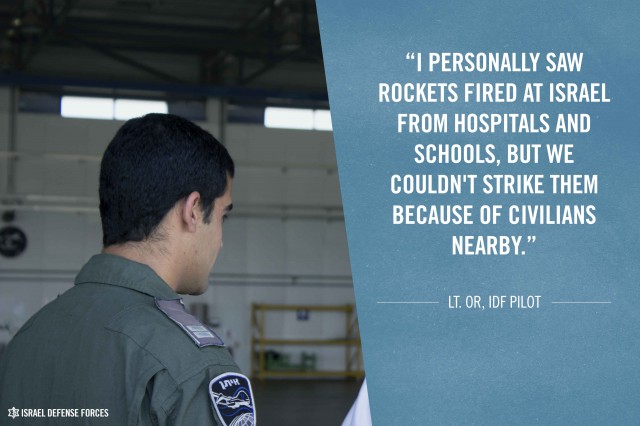Exclusive Interview With IAF Pilots: How They Limit Casualties
While the IDF goes to extraordinary lengths to avoid civilian casualties, Hamas deliberately puts civilians in the line of fire. The terrorist organization bases command centers, weapons storage facilities and concealed rocket launchers inside civilian neighborhoods, sometimes even inside houses. Lt. Or and Lt. Omer are two pilots in the Israel Air Force whose work reduces harm to civilians in Gaza.
Lt. Or is a 25-year-old soldier with an enormous responsibility. He decides whether to call off an airstrike in Gaza for the sake of preserving human life.
Lt. Or operates drones over Gaza in order to gather intelligence before airstrikes. The drones provide the IDF with a clear picture of the ground in real time. “Before every flight, we have a briefing about what is happening in the Strip,” said Lt. Or. “Then we perform a reconnaissance mission to ensure the intelligence matches the reality on the ground.”
The purpose of this intelligence gathering is to ensure that a strike on a target will not cause harm to civilians. “Before every airstrike, the pilot needs permission from us,” Lt. Or. emphasized. “We [Israel] are the only side in this conflict that attempts to prevent civilians from being harmed.”


Because Hamas has embedded its military infrastructure within civilian areas, the IDF often cancels airstrikes due to the appearance of civilians near a target. “I have personally seen rockets fired at Israel from hospitals and schools, but we couldn’t strike back because of civilians nearby,” said Lt. Or. “In one instance, we acquired a target but we saw that there were children in the area. We waited around, and when they didn’t leave we were forced to abort a strike on an important target.”
Drones are unmanned, but Lt. Or points out that “everything a UAV (unmanned aerial vehicle) does is directed by a human decision on the ground.” Though he and his peers can’t prevent the deaths of all civilians, Lt. Or explained that “Israel sees the death of every civilian as a tragedy. We do everything in our power to ensure that civilians are not harmed.”
“I am proud to be UAV pilot,” concluded Lt Or. “I am proud of the moral code of the IDF.”
Precision in the air
Lt. Omer, a fighter pilot, shares the burden of making tough decisions during air strikes. He flies his plane into Gaza and strikes targets in the area. He knows firsthand the challenge of fighting Hamas terrorists while they hide behind civilians.
“In Gaza, we use bombs that are extremely precise, and strike only Hamas targets – not civilians – once the UAVs have completed their surveillance.” Nonetheless, Lt. Omer knows that planes cannot always strike with accuracy, and that sometimes, operations can go wrong. “For every mistake that we make, we perform in-depth inquiries to make sure that it won’t happen again. We do everything we can to limit civilian casualties in Gaza. We target only Hamas facilities and infrastructure.”


Airstrikes are frequently canceled due to the proximity of civilians. “Two days ago, we were preparing to strike a target. Five seconds before we released the bombs, we were told to cancel the strike.”
Despite the danger posed to his life and the heavy burden he carries, Lt. Omer says he is “very proud to be a pilot in the IAF and protect Israel from Hamas’ rockets.”

